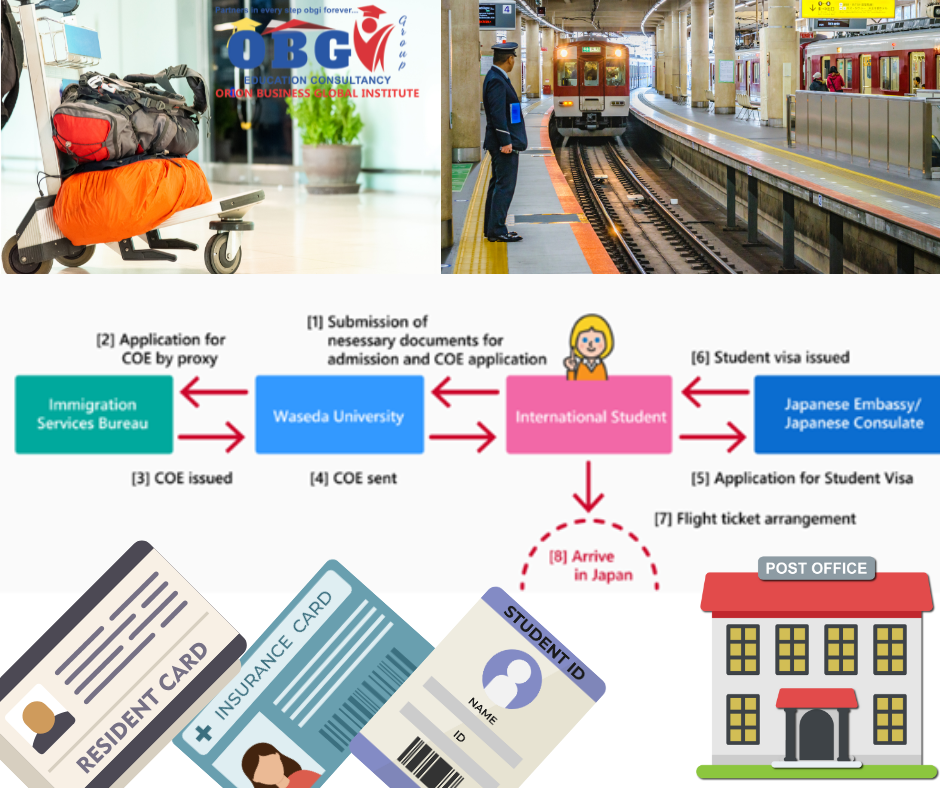
Post-Arrival Arrangements for Students in Japan
Once you arrive in Japan as an international student, there are several important arrangements and tasks to complete to ensure a smooth transition into your new life. Here’s a detailed guide on what you need to do after arriving in Japan
1. Immigration and Resident Card (在留カード, Zairyu Card)
• At the Airport:
Upon arrival at a major airport like Narita, Haneda, or Kansai, you will receive your Resident Card (Zairyu Card) from immigration officers. Ensure that your name, visa status, and period of stay are correct.
• Carry It Always:
This card is your official ID in Japan and must be carried with you at all times.
2. Register Your Residence (住民登録, Jumin Touroku)
• Within 14 Days of Arrival:
Visit your local city hall or ward office (区役所, Kuyakusho) to register your address. You will need:
• Your Resident Card
• Your passport
• The address of your accommodation (dormitory, apartment, etc.).
• Residence Certificate:
After registration, you will receive a copy of your Residence Certificate (住民票, Juminhyo), which is required for opening a bank account and other services.
3. Enroll in National Health Insurance (国民健康保険, Kokumin Kenko Hoken)
• Mandatory Requirement:
At the city hall, enrol in Japan’s National Health Insurance system. This will significantly reduce your medical expenses (you only pay 30% of the cost for most treatments).
• Monthly Fee:
The cost varies by city and income level but is generally affordable for students.
4. Open a Bank Account
• Why It’s Important:
You’ll need a Japanese bank account to pay for rent, receive part-time job salaries, and manage your finances. Popular banks include:
• Japan Post Bank (ゆうちょ銀行, Yucho Ginko)
• Mizuho Bank (みずほ銀行)
• Shinsei Bank (新生銀行).
• Requirements:
• Passport
• Resident Card
• Residence Certificate
• Inkan (personal stamp; sometimes not required for students).
5. Get a Mobile Phone and Internet Connection
• Mobile Phone Plans:
Choose from major carriers (e.g., NTT Docomo, SoftBank, AU) or budget-friendly alternatives like Rakuten Mobile or UQ Mobile.
• Internet:
Arrange for home internet service if not already provided by your accommodation. Pocket Wi-Fi is also an option for temporary use.
6. Transportation and Commuting
• Buy a Commuter Pass (定期券, Teikiken):
If you’ll be commuting to your university, purchase a commuter pass, which offers discounts on regular train or bus fares.
• Get a Suica or Pasmo Card:
These rechargeable IC cards can be used for public transportation and even small purchases at convenience stores.
7. Attend Orientation Programs
• Most universities organize orientation sessions for new international students. These sessions provide essential information about academic procedures, campus facilities, and local culture.
8. Part-Time Work Permit (資格外活動許可, Shikakugai Katsudo Kyoka)
• If You Plan to Work Part-Time:
Apply for a part-time work permit at the immigration counter at the airport or your local immigration office. This allows you to work up to 28 hours per week while studying.
9. Connect with Support Networks
• Student Support Centers:
Universities often have dedicated centres for international students to guide academics, housing, and personal issues.
• Community Groups:
Join Nepali or other international student associations for support and networking.
10. Familiarize Yourself with Local Customs
• Learn Basic Etiquette:
Japanese culture values politeness, punctuality, and cleanliness. Small gestures, such as bowing and using honorific language, go a long way.
• Explore Your Area:
Visit local supermarkets, convenience stores, and community centres to familiarize yourself with your neighbourhood.
Checklist of Essentials to Arrange Post-Arrival:
1. Receive your Resident Card.
2. Register your address at the city hall.
3. Enroll in National Health Insurance.
4. Open a bank account.
5. Get a mobile phone plan.
6. Purchase a commuter pass or IC card.
7. Attend university orientation.
8. Apply for a part-time work permit (if needed).
9. Connect with local communities and support networks.
By completing these post-arrival arrangements, you’ll be well-prepared to settle into your new life in Japan and focus on your studies and goals.